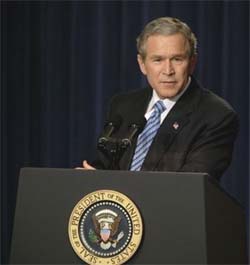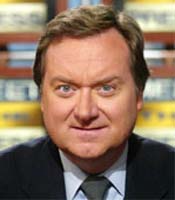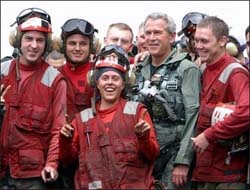
|
|
|
|
Bush on the Air: An Excess of Flatulence |
|
Before Team Bush was forced to synchronize its story about gaping holes in the president's service record while he was in the Texas Air National Guard. And, before revelations that the president's prescription drug plan for seniors - which will dramatically engorge the profits of Big Pharma - would cost one-hundred-plus billion more than administration projections. A few months ago, Karl Rove, Bush's top advisor, was sure enough of re-election that he attacked the mainstream media's coverage of the occupation of Iraq. Team Bush claimed the media failed to provide fair and balanced coverage; that it was only interested in the bad news stories. Charging that the mainstream media was not telling, or disregarding, the "goods news" stories about Iraq, the administration tried to take their message directly to the people, via local news channels, and smaller syndicated news outlets. Team Bush's usual suspects - vice president Dick Cheney, National Security Advisor Condoleezza Rice, Secretary of State Colin Powell and the gang - fanned out and gave dozens of interviews to local news anchors in smaller media venues around the country. The locals were flattered. They got their "fifteen" minutes. They didn't ask a heck of a lot of tough questions. Team Bush was getting what it wanted. The "good news" was finally receiving an airing. But there were still nagging questions: How many refurbished schools and libraries in Iraq equaled news that two or three or four more U.S. soldiers had been killed, administration critics asked? How many re-supplied hospitals offset the fact that the suicide rate among U.S. troops in Iraq was abnormally high? How many soccer fields and photos of kids kicking around a ball did it take to balance out the mounting toll of U.S. wounded? A shaky hour with Tim Russert Flash forward to February 2004:
I was wrong on both accounts. Russert did a reasonable job with his questions. Did he ask all the questions he should have? No. Did he follow-up some of Bush's answers by correcting him on the facts? No. Did he challenge the president as he's challenged Democrats? No. Another thing that he didn't do was also significant: He didn't badger the man. He held his ground and straightforwardly asked some of the important questions about the missing WMD; Bush's service record while in the Texas Air National Guard; and the administration's tax cuts and economic policy. (For an annotated transcript of the interview from the Center for American Progress, which takes issue with Bush on 17 points, see: http://www.americanprogress.org/site/pp.asp?c=biJRJ8OVF&b=28200&printmode=1 Bush to the max Russert let Bush be Bush and the president was Bush to the max. It didn't take long for the reviews to roll in. The verdict: Bush's first appearance on a weekend talk show went over about as well as the previous Sunday's Super Bowl advertisements - a lot of hot air followed by a series of over-exaggerated claims delivered with an excess of flatulence. Tom Shales, media critic for the Washington Post: "…from the outset of the session, came across as defensive and slightly, subtly agitated, with that "I'd rather be anywhere else right now" demeanor hiding behind his careful smile. It's widely known that Bush is uncomfortable in these ad-lib situations and so has held scandalously few televised press conferences during his term. Sitting down with Russert, who is known as tough but not bullying, was probably a wise political move." New York Times Editorial: "The only clarity in the president's vision appears to be his own perfect sense of self-justification.
Even some of Bush's long-time conservative supporters were disappointed and somewhat unnerved by his performance. Reagan groupie, and Wall Street Journal contributing editor, Peggy Noonan, wrote that Bush "seemed tired, unsure and often bumbling. His answers were repetitive, and when he tried to clarify them he tended to make them worse. He did not seem prepared. He seemed in some way disconnected from the event. When he was thrown the semisoftball question on his National Guard experience--he's been thrown this question for 10 years now--he spoke in a way that seemed detached. "It's politics." Well yes, we know that. Tell us more." The National Review's John Derbyshire called it "a pretty dismal performance." Confessing that he'll still vote for Bush Derbyshire added, "let's face it, the Great Communicator he ain't. The tongue-tied blather was coming thick and fast. At times, he looked like Al Sharpton on the Federal Reserve." But despite being unprepared and offering up a "pretty dismal performance," Bush may yet get his coveted spike in the polls. Not being in his element the president was clearly uneasy. He was surprisingly ill-prepared, given reports that he had spent part of the week rehearsing for the moment. But the president's style is not what should concern the American people. His thinking about serious issues is what should concern the American people. "The fuzziness and inconsistency of his comments" the New York Times editorialized, "suggest he is still relying on his own moral absolutism that in a dangerous world the critical thing is to act decisively, and worry about connecting the dots later." If the president was able to conclude from the inconclusive information provided by intelligence agencies that he should launch a pre-emptive strike on Iraq, now that that policy is in place what would it take for him to launch pre-emptive strikes on Iran, Syria, or Cuba for that matter. Is Bush's fate tied to bin Laden? One of the questions Bush refused to answer dealt with the whereabouts of Osama bin Laden. The Al Qaeda leader's death or capture may be crucial to Bush's re-election: Russert: Senator Charles Grassley, a Republican President Bush: Yes. Russert: said he is absolutely convinced we will capture Osama bin Laden before the election. Bush: Well, I appreciate his optimism. I have no idea whether we will capture or bring him to justice, may be the best way to put it. I know we are on the hunt, and Osama bin Laden is a cold blooded killer, and he represents the nature of the enemy that we face. These are these are people that will kill on a moment's notice, and they will kill innocent women and children. And he's hiding, and we're trying to find him. There's a - I know there is a lot of focus on Iraq, and there should be, but we've got thousands of troops, agents, allies on the hunt, and we are doing a pretty good job of dismantling al Qaeda better than a pretty good job, a very good job. I keep saying in my speeches, two thirds of known al Qaeda leaders have been captured or killed, and that's the truth. Russert: Do you have a pretty good idea where Osama is? Bush: You know, I'm not going to comment on that. |
 George W. Bush meets the press at a briefing at the White House
George W. Bush meets the press at a briefing at the White House  Tim Russert led George W. Bush in an hour of uncomfortable questions on Meet the Press
Tim Russert led George W. Bush in an hour of uncomfortable questions on Meet the Press  Tough questions: Was George W. Bush gung-ho to make war?
Tough questions: Was George W. Bush gung-ho to make war?